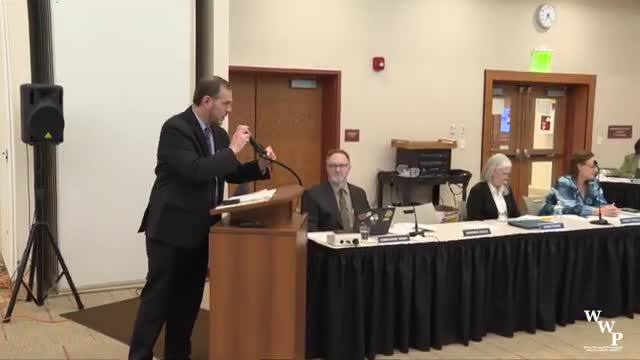West Windsor-Plainsboro presents tentative 2025–26 budget, cites federal funding risks and health‑care spike
Get AI-powered insights, summaries, and transcripts
Subscribe
Summary
Superintendent Dave Aderhold presented a tentative 2025–26 budget that relies on tax levy growth, use of banked cap and spending‑growth adjustments to cover rising health‑care, special‑education and capital costs and to protect programs if federal aid is cut.
Dr. Dave Aderhold, superintendent of the West Windsor‑Plainsboro Regional School District, presented the district’s tentative 2025–26 budget on March 18, saying the plan uses allowable tax‑levy increases and reserve authority to absorb rising costs and shield programs from possible federal funding cuts.
The budget presentation laid out the district’s revenue constraints, major cost drivers and contingency measures. Aderhold said district officials intend to adopt and file a preliminary budget at the meeting and submit it to the county superintendent for review, followed by a public hearing and final adoption April 29.
Aderhold said salaries and benefits remain the district’s largest expense and that health‑care renewal this year produced an unusually large increase. He said a negotiated renewal and a move to a state health insurance pool limited an otherwise much larger spike; the superintendent described a 10.6% health‑care increase that he said equates to about $4.7 million, and noted that a 2% general‑fund tax‑levy increase equals about $3.7 million in the district’s figures.
Nut graf: The administration proposed using allowable spending‑growth limitation adjustments (SGLAs), banked cap and reserves to raise roughly $9.7 million in additional revenue while budgeting about $11.5 million in known cost increases. The tentative plan includes a roughly $2.6 million contingency specifically to offset the potential loss of federal grant funding, the superintendent said.
Major budget items and pressures - Health care: The district moved to a different plan and managed to contain renewal costs to about a 10.6% increase; Aderhold said the dollar impact is approximately $4.7 million. He attributed the spike to two recent catastrophic claims while the district was self‑insured. - Special education: Aderhold said out‑of‑district tuition providers frequently exceed 10% annual price increases; the district has reduced out‑of‑district placements from about 120 students 16 years ago to just over 80 now by expanding in‑district programming. - Staffing: The tentative budget includes three growth positions aimed at reducing contracted service costs — an additional board‑certified behavior analyst (bringing the in‑district total to five), an additional speech therapist position and one teacher position tied to a post‑secondary program serving students aged 18–21. - Transportation: The superintendent noted route costs are indexed to a regional CPI measure; he cited driver shortages, fuel and insurance as continuing risks and said transportation increases are constrained by the 2% levy cap. - Facilities and capital: Two large capital items highlighted were the purchase/lease‑purchase of the Pathways (old Montessori) property and a large roof replacement project at Town Center. Aderhold said those two projects alone are responsible for more than $9 million of the capital plan. He also outlined an energy‑savings improvement project (ESIP) in progress that will be financed through bonding; the board was scheduled to consider multiple resolutions related to the ESIP and associated financing.
Contingencies and federal funding risk Aderhold and other administrators stressed that a principal uncertainty this year is potential reduction or restructuring of federal funds — including Teacher Preparation grants, certain nutrition and Medicaid reimbursements — after recent federal executive actions and departmental guidance. The administration reported approximately $3.1 million in current federal grants outside Medicaid, including about $600K in Title grants and roughly $135K associated with Medicaid reimbursement the district currently receives; they treated Medicaid separately because reimbursements depend on state and federal rules.
Aderhold said the administration budgeted an additional $2.6 million as a contingency to maintain programs (intervention, Title‑supported services, DEI positions, after‑school tutoring and other supports) in the event federal reimbursements are reduced or delayed.
Capital and energy projects Chief business and facilities matters mentioned by Aderhold and the finance committee included ESIP measures and a compressed summer construction schedule that requires some capital work to be paid from capital reserves in advance of a July bond sale. Projects listed for the summer included HVAC and rooftop unit replacements, boiler installations, building envelope work and continued ESIP measures; Schneider Electric was named project manager for the ESIP.
Board process and next steps Aderhold told the board the administration will file the preliminary budget with the county and host a public hearing for the final budget at the April 29 board meeting. He also noted that any change in the district’s assessed ratables between now and the April hearing could materially change the tax impact on individual properties; specific homeowner impact numbers will be provided after final equalization data is available.
Ending: The administration recommended the board adopt the preliminary budget at the March meeting and said it will continue to update the board and public through the April hearing as state and federal developments warrant.
